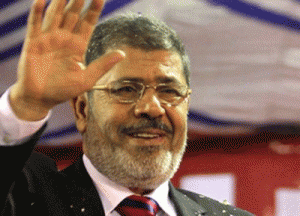Egypt’s army and Mohammed Morsi
Egypt’s army has removed President Mohammed Morsi from power, suspended the constitution and pledged new elections following mass protests.
The army chief announced the move in a TV address. The head of the constitutional court is expected to be sworn in as interim leader on Thursday.
Mr Morsi’s supporters denounced the move as a military coup and said he was being held in detention.
His opponents celebrated through the night in Cairo’s Tahrir Square.
But officials from Mr Morsi’s Muslim Brotherhood said – it’s main rally in Cairo had come under attack by armed assailants and there were reports of deadly clashes elsewhere.
The supreme justice of Egypt’s Supreme Constitutional Court was worn in as the nation’s interim president Thursday, replacing the ousted Islamist Mohammed Morsi.
Adly Mansour was sworn in Thursday at the Constitutional Court in a ceremony broadcast live on state television.
According to military decree, Mansour will serve as Egypt’s interim leader until a new president is elected. A date for that vote has yet to be set.
In his first remarks, Mansour praised the massive street demonstrations that led to Morsi’s ouster. He also hailed the youth behind the protests that began on June 30 – saying they embodied “the nation’s conscience, its ambitions and hopes.”
The military ouster of Egyptian President Mohammed Morsi will likely have ramifications far beyond the ancient country’s borders, potentially affecting the balance of power in the Middle East, the influence the U.S. can wield in the region and the worldwide price of oil.
“Egypt sits at the center of the Mideast” – said Joel Rubin, a former State Department desk officer for the region. “Cairo is the leading city in the Arab world … and Egypt’s government has always had a dominant role over the politics of the region.”
Egypt is “in many ways the most important country in the Middle East” – said Isobel Coleman, a senior fellow at the Council on Foreign Relations, with the “biggest population, the largest economy and a geographically critical location. … If it turns into a terrible, bloody civil war, it’s just bad for the whole region. It destabilizes the entire region.”
